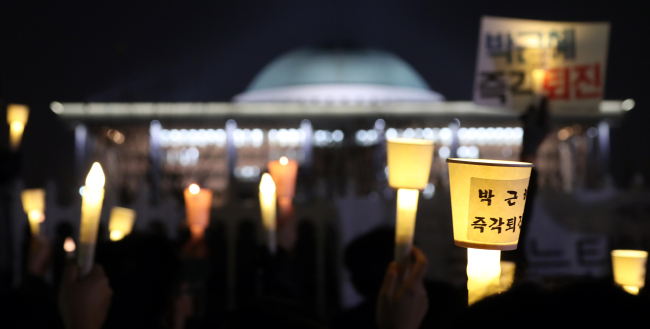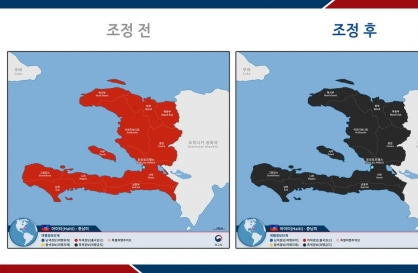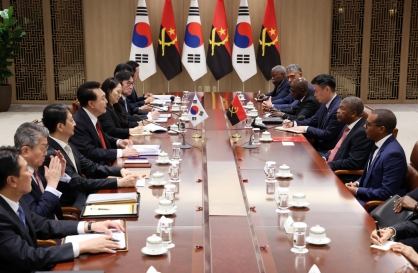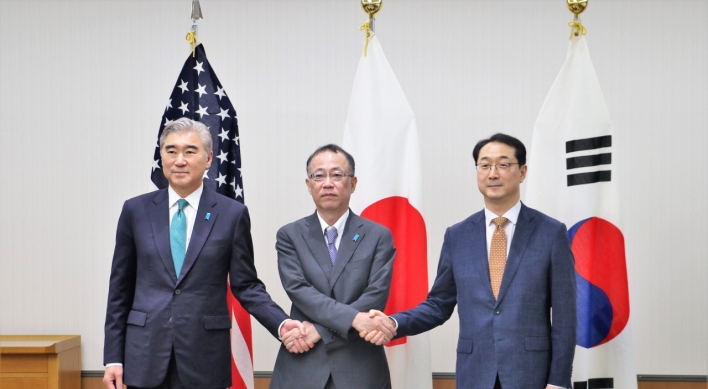Friday’s parliamentary vote on whether or not to impeach President Park Geun-hye is unlikely to involve a filibuster or physical brawls among rivalling lawmakers.
According to the National Assembly on Thursday, no lawmakers have requested time to address the floor ahead of the ballot during a plenary session slated for 3:00 p.m. Friday.
“Traditionally, the motion related to the seat of public officials does not require additional debate among those that approve and those that disapprove,” an official from the National Assembly dealing with legislative process told The Korea Herald.
The lawmakers could make last-minute requests for speeches during the session and take the stand if the National Assembly Speaker Rep. Chung Sye-kyun allows them to, the official added.
The impeachment motion against President Park, proposed by 171 lawmakers on Dec. 3, is the only issue on the agenda for the upcoming session.
According to the National Assembly on Thursday, no lawmakers have requested time to address the floor ahead of the ballot during a plenary session slated for 3:00 p.m. Friday.
“Traditionally, the motion related to the seat of public officials does not require additional debate among those that approve and those that disapprove,” an official from the National Assembly dealing with legislative process told The Korea Herald.
The lawmakers could make last-minute requests for speeches during the session and take the stand if the National Assembly Speaker Rep. Chung Sye-kyun allows them to, the official added.
The impeachment motion against President Park, proposed by 171 lawmakers on Dec. 3, is the only issue on the agenda for the upcoming session.

Since Friday is the last day of the Assembly’s current term, the bill will automatically die if the vote does not take place before midnight Friday.
The Assembly official said secret ballots usually take more than 30 minutes, but the impeachment vote -- to be held in an old-fashioned and secret manner using ballot papers -- could take even longer.
“Lawmakers may hesitate until the last minute given the seriousness of the matter,” the Assembly official said.
In 2004 when lawmakers voted to impeach then-President Roh Moo-hyun, the voting session lasted for about an hour.
Lawmakers will be given one ballot paper as well as one plate with their names engraved on it, which is designed to prevent multiple or illegal voting. If there is a mismatch between the number of ballots and plates, the voting is declared invalid and held again.
The ballot, which is slightly bigger than a name card, includes a space where lawmakers can mark their vote for or against the motion, using symbols in Korean or Chinese. Other symbols -- such as O or X -- are counted as invalid.
Wary of potential dissenting votes from those who had vowed to support the motion, some liberal politicians and civic groups suggested that the lawmakers should take a “proof picture” to show the voters that they had followed through on their commitment.
The leadership from the main opposition Democratic Party and runner-up People’s Party voiced concerns that the move would clash with the principle of a secret ballot and decided to leave the decision to the lawmakers.
“It seems to me that if the lawmakers refused to take the picture, they would be labeled as those who oppose the impeachment,” said People’s Party floor leader Rep. Park Jie-won. “I am hoping that fellow lawmakers make their decision by themselves.”
The ruling Saenuri Party leadership, however, dismissed the idea as “unconstitutional,” claiming that the measure would undermine the rule of modern democracy.
“Each lawmaker is required to cast their ballots in accordance with their conscience and political faith,” said Saenuri floor leader Rep. Chung Jin-suk.” Taking the picture of the vote and posting it online is an absurd request that I don’t need to respond to.”
By Yeo Jun-suk (jasonyeo@heraldcorp.com)
The Assembly official said secret ballots usually take more than 30 minutes, but the impeachment vote -- to be held in an old-fashioned and secret manner using ballot papers -- could take even longer.
“Lawmakers may hesitate until the last minute given the seriousness of the matter,” the Assembly official said.
In 2004 when lawmakers voted to impeach then-President Roh Moo-hyun, the voting session lasted for about an hour.
Lawmakers will be given one ballot paper as well as one plate with their names engraved on it, which is designed to prevent multiple or illegal voting. If there is a mismatch between the number of ballots and plates, the voting is declared invalid and held again.
The ballot, which is slightly bigger than a name card, includes a space where lawmakers can mark their vote for or against the motion, using symbols in Korean or Chinese. Other symbols -- such as O or X -- are counted as invalid.
Wary of potential dissenting votes from those who had vowed to support the motion, some liberal politicians and civic groups suggested that the lawmakers should take a “proof picture” to show the voters that they had followed through on their commitment.
The leadership from the main opposition Democratic Party and runner-up People’s Party voiced concerns that the move would clash with the principle of a secret ballot and decided to leave the decision to the lawmakers.
“It seems to me that if the lawmakers refused to take the picture, they would be labeled as those who oppose the impeachment,” said People’s Party floor leader Rep. Park Jie-won. “I am hoping that fellow lawmakers make their decision by themselves.”
The ruling Saenuri Party leadership, however, dismissed the idea as “unconstitutional,” claiming that the measure would undermine the rule of modern democracy.
“Each lawmaker is required to cast their ballots in accordance with their conscience and political faith,” said Saenuri floor leader Rep. Chung Jin-suk.” Taking the picture of the vote and posting it online is an absurd request that I don’t need to respond to.”
By Yeo Jun-suk (jasonyeo@heraldcorp.com)


















